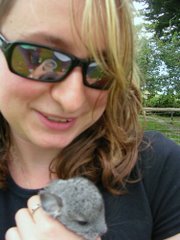Czech writers share certain similarities in their work. Take the two most famous Czech writers, Franz Kafka (Metamorphosis) and Milan Kundera (The Incredible Lightness of Being). Kafka's work is dark, philosophical and, well, kinda weird but beautiful; in 'Metamorphosis' he writes about a man transformed into a cockroach in his sleep. Kundera's intensely beautiful work is philosophical, often gloomy and self reflective and, well, weird; in 'Identity' he ponders whether someone loses their identity if you fail to recognise them; in 'The Incredible Lightness of Being' he tackles the topic of Being through an exploration of (mostly adulterous) relationships.
Having visited the Czech Republic, I know understand why these writers share such commonalities. Czech is a dark, gloomy, weird and intensely beautiful place, which inspires philosophical introspection.
Dark and Gloomy: Czech architecture is the stuff of vampire movies. It's a combination of Art Nouveau, pointed spires, castles and water stained, dark stone. Unlike neighbouring countries, Czech doesn't seem to have suffered too badly from WWII bombings, thus Praha evokes an older era; one in which people believe in horrors and superstitions. The castle looming on the other side of the river looks as though it could house all sorts of nasty creatures, while the church dominating Wenceslas square has the aura of a stern, Gothic watchtower. Doors and windows sport carved details, such as screaming faces within fanged mouths, or rats climbing frames. The blackened statues of the Charles Bridge bear testimony to the climate of Praha- rainy. A sudden and unbelievably intense downpour seems standard for Czech.
Weird: Kutna Hora, an hour out of Praha, is visited for its one tourist attraction. No, I don't mean the exhibition at the cigarette manufacturer. Kutna Hora is home to an ossuary; a bone church. Following massive deaths from the plague, the area had far more bodies than they could bury. So they didn't. Instead the bones were cleaned and used to create decoration inside the church. Yes, decoration. Some of the bones (mostly skulls and femurs) were piled into four enormous pyramids, with candles burning within. Others were used for to more delicate decoration: a coat of arms sporting a bird (made of human bones) pecking the eye out of a skull; crosses reminiscent of pirate flags; the signature of the 'artist'; and a giant candelabra, which dominates the interior of the building and uses every bone in the human body. Gross. But really, really cool.
Introspective: Czech Republic, Czechoslovakia, Bohemia. Whatever you choose to call the area, it is one which has been fought over and dominated by many powers throughout history. Czech Bohemia was part of the Austrian Empire for ages, despite attempts to gain Independence. Once the Empire fell, Czechoslovakia put up little resistance to the invading German army, having learned from failed war efforts in the past. This passivity led to their submission to the Soviet Union, and resulted in Czechoslovakia being hidden behind the Communist Iron Curtain for quite some time. Now liberated, Czech Republic still bears the philosophical and self-reflective air inspired by the dark years of oppression, and the weight of a cloud-heavy sky bearing upon grim Gothic buildings. When looking around can be dangerous or terrifying, people are often led to look within themselves, and their fellow man.
Beautiful: Everywhere you look in Praha, an amazing sight greets your eyes. It might be the sparkle and gleam of a Swarovski store, the modern counterpart of traditional Bohemian crystal-smiths. It might be the sun setting over the river, and setting the spires of the churches, castles, bridge gates alight. It might be the intricate detail in a building only just noticed, although you've passed it frequently. Despite attempts to tread them down, the Czech's have stubbornly clung to their language, their traditions, their identity, and have created beauty reflective of their world. Their world may have metamorphosed for a time into something dark and unpleasant, but it's clear that here is a nation unwilling to give up on the incredible lightness of being.
Subscribe to:
Post Comments (Atom)

Good post. BTW it's "The Unbearable Lightness of Being" not the "incredible"!
ReplyDelete